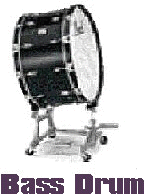Bass Drum
Bass Drum
Contents :
History
The term bass drum has been used for two distinct instruments. The first had a short shell with a wide head. It can be traced back to the 14th century in Europe. This drum was known to the West as the Turkish drum until the 19th century.
The other bass drum was a long drum. The length of its cylinder was about twice the width of the diameter. This drum was changed until it resembled the other one during the course of the 19th century. Its shell was shortened and widened, and the shell was replaced with brass.
A cord was once used to attach the head of a drum to the shell. It was done by wrapping a cord around the border of skin that overlapped the shell. This was later replaced when the hoop was added to the head around which the excess skin was lapped.
Laces were used to increase the tension of the heads. It was accomplished by lacing a cord in a W or Y pattern around the shell. This method was replaced with the development of a top hoop. This hoop had tension screws, which could alter the tautness of the drumhead.
The bass drum was first introduced into European music in the 18th century. It came from the Turkish military music being produced at the time.
Top
Description
The bass drum is made from two heads attached to either side of a shell. The body is shallow compared to the heads because the diameter is always greater than the length. The minimum diameter for an orchestral bass drum is 32 inches. The bass drum is set with its head facing sideways.
The shell is made of brass or laminated wood. The head is usually made of animal skin or plastic. There are two hoops for each head. The bottom hoop is around the edge of the head. It is attached to the shell by tension screws with to the top hoop placed over the head. This top hoop pushes against the bottom hoop to hold the skin taut.

Top
Sound Production
Sound is produced when the player creates a vibration by striking the drumhead with a padded stick. The bass drum is struck close to the rim. This causes the skin of the drumhead to vibrate. The resonator is the wall of the drum.
